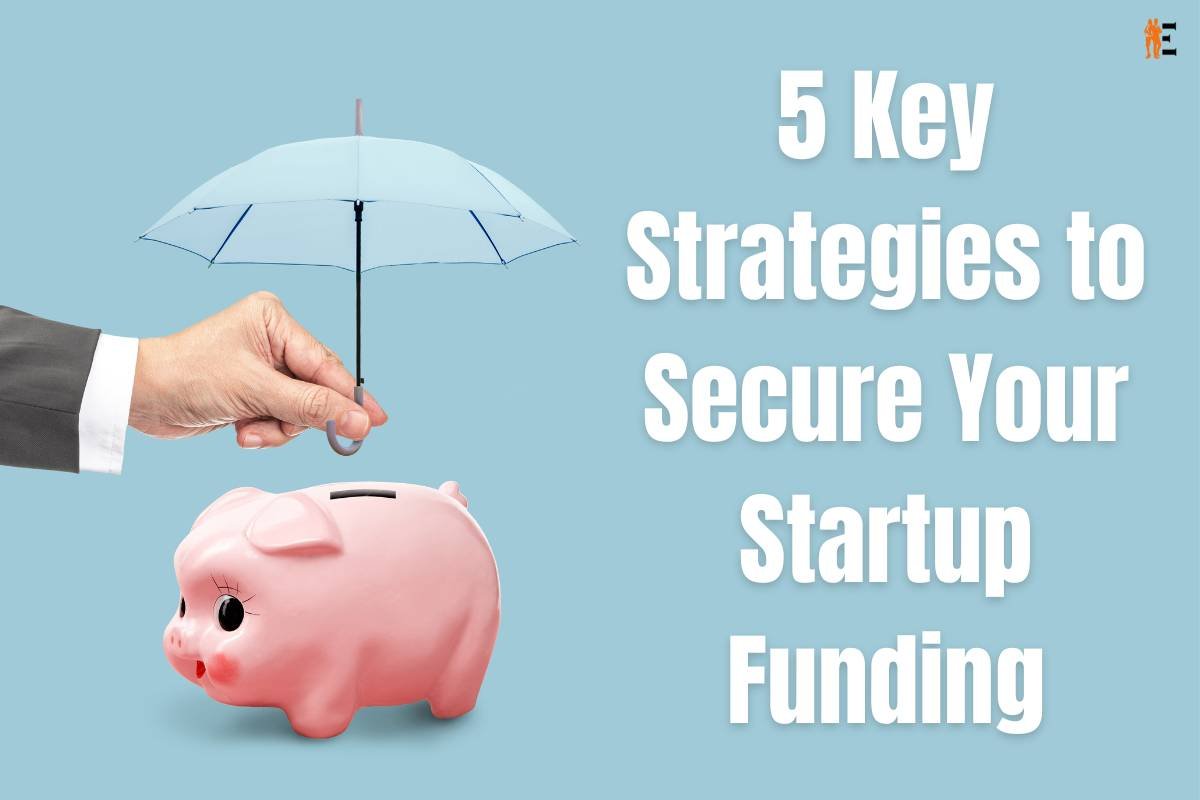When beginning a company, the crucial components of your success are the quality of your ideas and your commitment to put in the effort necessary to see those ideas come to life. The cream rises to the top of the milk of capitalist meritocracy. Nothing is preventing you from converting all that money sitting in your trust fund into a profitable company with little guts, know-how, and steely-eyed determination. Make your imprint in a world full of opportunities!
What’s that, you say? You don’t have a large trust money from which to draw? In such a situation, it seems that you will need to raise some funds.
Here are 23 Smart Ways to Finance Your Startup;
1) Make use of personal savings
Many entrepreneurs may not be able to finance themselves. Yet, according to the nonprofit organization SCORE, 78% of beginning firm entrepreneurs did not seek starting finance other than personal savings or employment income in their first year.

You may not have a lot of money, but you may always strive to alter that. You could sell your automobile and take the bus instead. Rent an apartment over a restaurant instead of selling your property. Perhaps retain the house and seek a home equity loan or line of credit. Just be sure you keep up with the payments, or you’ll be wishing you had gotten the apartment when you had the opportunity.
2) Use Retirement Accounts
Another possibility is to borrow funds from your assets. You have the option of borrowing funds from your 401(k) or IRA savings account. These are risky solutions and should not be your first choice. If you were aiming for a less risky existence, you would have chosen a more conservative field of employment. Therefore be cautious, but keep in mind that these possibilities are accessible to you.
Investors may see your company as a more desirable investment if they sense that you have a personal interest in its success. Use Retirement Accounts is one of the Smart Ways To Finance Your Startup. If you’re considering taking money out of your retirement savings, you should check at Rollovers as Business Starts (ROBS). A ROBS funder will enable you to use your retirement money tax-free to finance a new company or purchase an existing one for a fee.
3) Consult with Friends and Family
Another option is to solicit funds from friends and family. It’s one thing to put your cash at risk by embarking on the inherently hazardous venture of establishing a company. It’s quite another to jeopardize your intimate personal ties. Consider the danger you’re putting your loved ones in. Consider how utilizing money from friends or relatives may cause you to remain with a losing proposition for a longer period than is sensible.
If you decide to seek company capital from friends and family, do yourself a favor and go through all of the right legal processes with properly drafted documentation.
You should also seek a loan rather than an equity investment. If you want the latter, your friends and family will have the legal right to participate in significant company decisions. Consult with Friends and Family is one of the Smart Ways To Finance Your Startup.
4) Apply for a Personal Loan
Business loans might be difficult to secure while beginning a company, owing to your lack of previous firm income. It’s a typical “chicken and egg” situation. Personal loans might provide a remedy in situations like these. Although obtaining a corporate loan is often contingent on factors such as your company’s health and creditworthiness, obtaining a personal loan is focused on your traits. Lenders will extensively examine your credit score, source of income, debt-to-income ratio, and anticipated loan usage.
Personal loans typically have a ceiling of $35,000, while some lenders cap it at $50,000 or more. This is a tiny portion of the amount you may borrow with a business loan, which can be up to $1 million. Simply said, since startups are inherently hazardous endeavors, the amount of cash lenders are prepared to offer you is severely constrained.
If you believe a personal loan would be Smart Ways To Finance Your Startup, check out our guide on securing a personal loan for business.
5) Utilize Credit Cards
In your personal life, credit cards might always come in handy. The same is true for funding your company.
Small company credit cards might have credit limits of up to $50,000. Credit cards may be one of the most convenient ways to finance a new company since you may use them without having your business ideas examined by some grand poobah.
Of course, the ease of use of credit cards is offset by hefty interest rates. You don’t want your credit card debt to accumulate interest, so pay it off as quickly as possible, preferably inside the no-interest grace period.
6) Submit Grant Applications
What better method to support your company than with free money? It’s not simple to get a grant to help your new firm. That’s why you don’t hear about it very frequently. Grant programs, on the other hand, do exist. A grant may be available from a variety of sources, including:
- Grant programs administered by the federal government
- Grant programs offered by state and municipal governments
- Private grant-making organizations
- Grant programs are available for certain sorts of enterprises as well as specific sectors of the population. Veterans, women, single moms, and other groups may apply for small business grants.
If you want to be considered for a grant, you must be prepared to create a lengthy and thorough submission. Grants are competitive, and only the most persuasive requests are heard.
Grant programs may grant sums as modest as a few hundred dollars to participants, so don’t expect to surf a wave of free money to company success. Yet, if you discover a program with which you connect well and have a particularly moving tale to tell (and the time to tell it), you have nothing to lose by giving it an attempt. Submit Grant Applications is one of the Smart Ways To Finance Your Startup.
7) Get A Bank Loan
Entrepreneurs looking to start their first firm are more likely to get one of the aforementioned forms of loans than a bank loan. Banks often want a track record of profitability before allowing you to touch their money, which is an apparent issue for a new firm or startup.
Nonetheless, if you have a substantial quantity of collateral, great credit, and business expertise, don’t rule out bank loans as a viable source of cash. A bank commercial loan is similar to a mortgage in that it has a set interest rate, fixed monthly/quarterly payments, and a maturity date.
8) Securing an Angel Investor
Angel investors are rich businesspeople who fund businesses with the potential to increase their fortune. Angel investors do not provide loans; instead, they make equity investments in exchange for a stake in your firm. According to Entrepreneur, angel investments often range between $600,000 and $1 million, so we’re not talking small coin here.
If you have more potential than cash on hand, it’s a highly appealing financing option to consider. But beware: you’ll also be handing up 10% to 50% of your company. With this guide on angel investors’ pros and drawbacks, you can determine if this sort of investment is ideal for your firm. Securing an Angel Investor is one of the Smart Ways To Finance Your Startup.
If you believe you can make it work, angel investors are a very appealing source of funding since you will not have to make interest payments on the investment.
9) Make Use Of A Crowdfunding Platform
Crowdfunding flips the usual method of startup capital raising on its head. Instead of taking your sales presentation to investors and institutions in the hopes of being heard, you receive a platform to set out your goals and requirements for your new firm.
By harnessing the benefits of the internet, you let investors come to you – a considerably more efficient method of selling woo to possible funders.
Interested? Get our best suggestions for starting a crowdfunding campaign for your new company. Many crowdfunding platforms operate in somewhat different ways. In the following sections, we will go through some of the more common solutions.
10) Use Kickstarter to raise funds.
Kickstarter, by far the most popular crowdfunding site, has become associated with crowdfunding. Kickstarter states on its website that over 19 million individuals have supported a project, that over 5.4 billion have been committed, and that over 190,000 projects have been successfully financed. Kickstarter is a platform for “rewards-based” fundraising.

Rather than pursuing financial or equity returns, investors typically receive a “reward” for their generosity. In most cases, backers get to use the final product or service before anyone else. Kickstarter is a great alternative for entrepreneurs with a compelling proposal, but bear in mind that the site only distributes cash given to your firm when your campaign has met its financing target. Only around 36% of Kickstarter initiatives meet their financing target. The others fall short, leaving the campaigner with nothing. Use Kickstarter to raise funds is one of the Smart Ways To Finance Your Startup.
11) Fundraise via Indiegogo
Indiegogo began as a crowdfunding tool for indie films but has subsequently evolved into general-purpose crowdfunding. Indiegogo now provides an opportunity in more business sectors than Kickstarter.
While it does not get the same level of media exposure as Kickstarter, Indiegogo has more active projects running at any one moment than Kickstarter. It might be because, unlike their more well-known rivals, Indiegogo crowdfunding projects are not required to reach their fundraising target to receive cash. All-or-nothing financing campaigns are provided by Indiegogo, nevertheless, since many supporters may find it a more tempting prospect. Fundraise via Indiegogo is one of the Smart Ways To Finance Your Startup.
12) Use GoFundMe to raise funds.
GoFundMe is a popular crowdsourcing tool for personal causes and bad life occurrences. You might, however, try to raise starting capital using the platform.
This platform is not related to any current investment community. Donations will most likely come from individuals in your network, as well as those to whom you can spread the news. As a result, GoFundMe is designed for social sharing. Use GoFundMe to raise funds is one of the Smart Ways To Finance Your Startup.
There is no all-or-nothing financing requirement with GoFundMe. But, you will be charged the same costs whether your campaign raises $2000 or $20.
If your new venture is tied to a personal or societal purpose, GoFundMe is a worthwhile crowdfunding option.
13) Participate in a Funding Competition
Funding competitions are an unconventional way to raise funds for a company launch. Tradition, on the other hand, is overstated. Every year, programs such as the Amazon Web Services Start-Up Challenge and the MIT $100K Entrepreneurship Competition provide entrepreneurs the opportunity to compete for thousands of dollars in investment.
As you can expect, these competitions attract a large number of applications. Make an effort to convey your proposal originally and interestingly. In a sea of hungry funding hunters, your ideas must stand out.
14) Make use of peer-to-peer lending
Peer-to-peer (P2P) lending, also known as social lending or crowdlending, mixes the Kickstarter crowdfunding concept with more conventional lending techniques. P2P services are simply matching platforms that link inexperienced investors with companies in need of capital.
P2P loans offer two major benefits over regular loans.
The first is that most applications are submitted online. You are not required to meet with a filled suit or open your company for examination. The whole procedure may be completed at home, in your pajamas (like most of the truly important things in life).
The second benefit is that the approval and funding procedure is frequently significantly quicker than with conventional loans. Make use of peer-to-peer lending is one of the Smart Ways To Finance Your Startup.
The disadvantage is that P2P lenders are notoriously risk-averse when it comes to lending to those with bad credit.
15) Get A Microloan
Microloans are available to borrowers who do not meet the collateral and cash flow standards for typical bank loans. Microloans are deemed less hazardous than other kinds of company financing since they are for tiny sums of money.
Microloans are defined as loans of $50,000 or less. You may be able to get this form of finance via charity or internet lenders. In this tutorial, you can learn more about microloans and how to get them.
16) Request an SBA Microloan
SBA lenders are encouraged to issue smaller business loans with lower interest rates (between 6% and 8% yearly) to qualifying firms with strong credit as part of the SBA Small Business Lending Advantage program. Childcare-related NGOs are more likely to be eligible for such financing. According to the SBA, the average loan amount is $13,000, with a maximum loan term of six years. Request an SBA Microloan is one of the Smart Ways To Finance Your Startup.

SBA microloans must only be used for the following purposes:
- Capital for working purposes
- Stock or supplies
- Fixtures or furniture
- Equipment or machinery
- An SBA microloan cannot be used to consolidate debts or to buy real estate.
17) Fundraise on Kiva
Kiva is a nonprofit microlender that provides loans with 0% interest and no collateral. Isn’t it amazing? Kiva has a $10,000 maximum loan size, thus their loans are micro. Moreover, the application procedure is lengthy and difficult. 0% interest and no collateral, on the other hand!
Kiva is recognized for providing its consumers with a personal touch, which is not typical in this industry. In an industry filled with exploitative methods, Kiva tries to be a constructive community force, which I can support.
18) Apply for an Accion Loan
Another private nonprofit microlender is Accion. Unlike Kiva, their loans do have interest (8% – 22%) and may demand collateral. Accion loans, on the other hand, maybe as much as $50,000.
Accion not only provides microloans but also financial education, hosting seminars and events around the nation to help developing small enterprises get off the ground. They are also known for their honesty and good customer service. Apply for an Accion Loan is one of the Smart Ways To Finance Your Startup.
19) Make an SBA 7(a) Loan Application
An SBA 7(a) loan is partly insured by the SBA and in which the lender undertakes not to exceed specific interest rate and loan duration restrictions. The initiative is intended to assist borrowers who are unlikely to be approved for a commercial loan from a bank.
To qualify for an SBA 7(a) loan, you must show that the SBA was not the first place you looked for funding. The 7(a) program may be worth exploring for fledgling enterprises with proven promise.
20) Get an SBA CDC/504 loan.
Another SBA loan program, CDC/504 loans, are instruments used by the government to assist select firms in achieving certain public policy objectives, such as energy efficiency or minority-owned company development.
The SBA allows CDC/504 loans to be used for the following purposes:
- Purchase of land, including existing structures
- Improvements such as grading, roadway upgrades, utilities, parking lots, and landscaping are purchased.
- Building new facilities or updating, restoring, or converting existing ones
- Long-term machinery and equipment purchases
- These aren’t the things that most startups desire to pursue, but if your new firm is engaged in any of the above, and your business objective is considered by the SBA as supporting their public policies, you may want to check into this program.
21) Make Use of Trade Credit
Trade credit is credit granted to you by suppliers that allows you to purchase now and pay later. You are utilizing trade credit when you accept delivery of supplies, equipment, or other assets without paying cash at the moment.
As trade credit is trust-based, it’s not simple for a company to get. Yet, if you have your ducks in a row, you can sell this agreement to your suppliers just as you would a bank loan. Include a clear business strategy and materials.
Make Use of Trade Credit is one of the Smart Ways To Finance Your Startup. Trade credit is a long shot for new enterprises, which is why it ranks at the bottom of the list. Nonetheless, keep it in mind as an option.
22) Provide Pre-Sales
Another route to finance that is challenging is if you are a startup with no existing reputation, but if you have the correct marketing talents, you may be able to pull it off.
Assume you’re in the middle of developing a basic yet addicting video game. People go crazy for the game demo you show off on your prominent YouTube channel. Even the comment haters on YouTube are amazed. If enough people like you, you may be able to persuade them to pre-pay for the privilege to download the final product on launch day. Provide Pre-Sales is one of the Smart Ways To Finance Your Startup. There is no middleman involved, allowing you immediate access to the funds you need. It’s so absurd that it could just work.
23) Apply for a PayPal Working Capital Loan
You may not aware that PayPal provides loans, but yes, in fact, they do. PayPal Working Capital provides short-term business loans based on the PayPal profits of an established firm — in other words, it’s a financing option that needs some business experience. PayPal loans are not for the brand-new firm with no profits, but for new enterprises with some earnings, they might be an appealing choice. Apply for a PayPal Working Capital Loan is one of the Smart Ways To Finance Your Startup.
To apply, just complete an application accessible via your PayPal account. In this case, you won’t need to supply any further information since PayPal is already your credit card processor. They are very aware of your financial circumstances!
Also Read: Tips for Managing Small Business Finances











